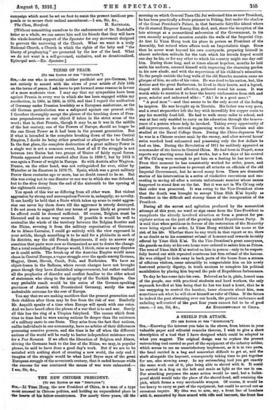TERMS OF PEACE.
[To TEE EDITOR or THE "SpseTATOR."1 SM,—As one who is certainly neither pacificist nor pro-Cerman, but not entirely in accord with the views of your article of July 15th on the terms of peace, I ask leave to put forward some reasons in favour of a more moderate view. I may say that my sympathies have been against Prussia in every war in which she has been engaged within my recollection, in 1864, in 1866, in 1870, and that I regard the unification of Germany under Prussian headship as a European misfortune, as the old German particularism was a safeguard against our present evils. I therefore thoroughly accept the phrase of the breaking down of Prus- sian preponderance as our object if taken in the strict sense of the word ; that is, that Prussia, though it may be, as it was in the middle of the last century, one of the Powers of Europe, should no longer be the one Great Power as it had been in the present generation. But if what is intended is the complete breaking down of the two Central Empires, I doubt its being either practical or altogether to be desired. In the first place, the complete destruction of a great military Power in a single war is not a common event, least of all if the struggle is not between two States but two groups of States of fairly equal forces. Prussia appeared almost crushed after Jena in 1806-7, but by 1813 it was again a Power of weight in Europe. So with Austria after Wagram. France, on the other hand, was not extinguished for ever, either by Waterloo or its disasters in 1370-71. Spain, which was a great military Power three centuries ago or more, has no doubt ceased to be so. But this was owing not to one disaster or one war in which she was defeated, but to the slow decay from the end of the sixteenth to the opening of the eighteenth century.
You speak of this war as differing from all other wars. But violent aggression by strong and unscrupulous Powers is, unhappily, no novelty. It can hardly be held that a State which takes up arms to resist aggres- sion can never lay them down till the aggressor Is utterly destroyed. I do not mean to suggest that any terms of peace likely at present to be offered could be deemed sufficient. Of course, Belgium must be liberated and in some way secured. If possible it would be well to neutralize the whole of the territory between the Belgian frontier and the Rhine, severing it from the military organization of Germany. As to Alsace-Lorraine, I could go entirely with the view expressed in your article, though something is to be said for a plebiscite in each of its districts, say the old French departments, if only to answer any assertion that parts were now so Germanized as not to desire the change. But a total remodelling of Europe would, I think, raise as many disputes as it could settle. The break-up of the Austrian Empire would mean chaos in Central Europe, a vague struggle over the spoils among German, Magyar, Croat, Slovak, Czech, Pole, and Ruthenian. We have an object-lesson in the Balkans, where recent changes have not brought peace though they have diminished misgovernment, but rather realized all the prophecies of disorder and conflict familiar to the older school of statesmen who clung to the integrity of the Turkish Empire. One very probable result would be the union of the German-speaking provinces of Austria with Prussianized Germany; surely the most undesirable outcome for the rest of Europe.
You say that we are making sacrifices that the present generation and
their children after them may be free from the risk of war. Similarly Mr. Asquith speaks of a time when Europe will speak with one voice. And we have heard often the phrase of a war that is to and war. Surely all this has the ring of a Utopian fairyland. The causes which from time to time lead to wars among nations lie deeper than the existence of a military caste in one State. They arise from the fact that nations, unlike individuals in one community, have no arbiter of their differences possessing coercive powers, and the time is far off when the different nations of the world will be ready to barter independent existence even for a Pax Ramona. If we effect the liberation of Belgium and Alsace, driving the Germans back to the line of the Rhine, we may, in popular phrase, be said to have done a good day's work. But if we are to be satisfied with nothing short of creating a new world, the only end I imagine of the struggle would be what Lord Bryce says of the great European struggle of the seventeeth century, that it ended because while the reasons for war -continued the means of war were exhausted.—






























 Previous page
Previous page